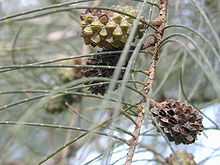Casuarina equisetifolia
| Casuarina equisetifolia | |
|---|---|
 | |
| C. equisetifolia subsp. incana | |
| Scientific classification | |
| Kingdom: | Plantae |
| (unranked): | Angiosperms |
| (unranked): | Eudicots |
| (unranked): | Rosids |
| Order: | Fagales |
| Family: | Casuarinaceae |
| Genus: | Casuarina |
| Species: | C. equisetifolia |
| Binomial name | |
| Casuarina equisetifolia L. | |
| Subspecies | |
|
C. e. subsp. equisetifolia | |
Casuarina equisetifolia is a she-oak species of the genus Casuarina. The native range extends from Burma and Vietnam throughout Malesia east to French Polynesia, New Caledonia, and Vanuatu, and south to Australia (north of Northern Territory, north and east Queensland, and north-eastern New South Wales).[1] Populations are also found in Madagascar, but it is doubtful if this within the native range of the species.[2][3] The species has been introduced to the Southern United States and West Africa.[4] It is an invasive species in Florida.[5][6]
Taxonomy
Casuarina equisetifolia was officially described by Linnaeus in 1759 as Casuarina equisefolia. A type was designated by New South Wales botanist Lawrie Johnson in 1989.[7] The specific name equisetifolia is derived from the Latin equisetum, meaning "horse hair" (referring to the resemblance of the drooping branchlets to horse tail).[1] Common names include coast sheoak (coast she oak, coastal she-oak), beach casuarina, beach oak, beach sheoak (beach she-oak), whistling tree, horsetail she oak, horsetail beefwood, horsetail tree, Australian pine, ironwood, whistling pine, Filao tree, and agoho.[8][1][9]
There are two subspecies:[10][11]
- Casuarina equisetifolia subsp. equisetifolia. Large tree to 35 m (115 ft) tall; twigs 0.5–0.7 mm (0.020–0.028 in) diameter, hairless. Southeast Asia, northern Australia.[12]
- Casuarina equisetifolia subsp. incana (Benth.) L.A.S.Johnson. Small tree to 12 m (39 ft) tall; twigs 0.7–1 mm (0.028–0.039 in) diameter, downy. Eastern Australia (eastern Queensland, New South Wales), New Caledonia, southern Vanuatu.[13]
Description
Casuarina equisetifolia is an evergreen tree growing to 6–35 m (20–115 ft) tall. The foliage consists of slender, much-branched green to grey-green twigs 0.5–1 mm (0.020–0.039 in) diameter, bearing minute scale-leaves in whorls of 6–8. The flowers are produced in small catkin-like inflorescences; the male flowers in simple spikes 0.7–4 cm (0.28–1.57 in) long, the female flowers on short peduncles. Unlike most other species of Casuarina (which are dioecious) it is monoecious, with male and female flowers produced on the same tree. The fruit is an oval woody structure 10–24 mm (0.39–0.94 in) long and 9–13 mm (0.35–0.51 in) in diameter, superficially resembling a conifer cone made up of numerous carpels each containing a single seed with a small wing 6–8 mm (0.24–0.31 in) long.[2][14]
Like some other species of the Genus Casuarina, Casuarina equisetifolia is an actinorhizal plant able to fix atmospheric nitrogen. In contrast to species of the Fabaceae family of plants (e.g., beans, alfalfa, Acacia), Casuarina harbours a symbiosis with a Frankia actinomycete.
Distribution and habitat
Casuarina equisetifolia is found from Burma and Vietnam throughout Malesia east to French Polynesia, New Caledonia, and Vanuatu, and south into Australia (the northern parts of Northern Territory, north and east Queensland, and northeastern New South Wales, where it extends as far south as Laurieton.[15]
-

C. equisetifolia subsp. equisetifolia
-

C. equisetifolia stems and leaves
-

C. equisetifoliafruits
Uses
Casuarina is widely used as a bonsai subject, particularly in South-east Asia and parts of the Caribbean. Indonesian specimens and those cultivated in Taiwan are regarded among the best in the bonsai world. The wood of this tree is used for shingles, fencing, and is said to make excellent, hot burning firewood. Among the islands of Hawaii, Casuarina are also grown for erosion prevention, and in general as wind breaking elements.
References
- ↑ 1.0 1.1 1.2 Boland, D. J.; Brooker, M. I. H.; Chippendale, G. M.; McDonald, M. W. (2006). Forest trees of Australia (5th ed. ed.). Collingwood, Vic.: CSIRO Publishing. p. 82. ISBN 0-643-06969-0.
- ↑ 2.0 2.1 "Casuarina equisetifolia L., Amoen. Acad. 143 (1759)". Australian Biological Resources Study. Australian National Botanic Gardens. Retrieved 23 April 2011.
- ↑ http://www.worldagroforestrycentre.org/sea/Products/AFDbases/AF/asp/SpeciesInfo.asp?SpID=477
- ↑ "Plant for the Planet: Billion Tree Campaign". United Nations Environment Programme. Retrieved 23 April 2011.
- ↑ "Biological control of Australian native Casuarina species in the USA". Commonwealth Scientific and Industrial Research Organisation. 16 May 2007. Retrieved 16 September 2010.
- ↑ Masterson, J. "Casuarina equisetifolia (Australian Pine)". Fort Pierce: Smithsonian Marine Station. Retrieved 5 May 2009.
- ↑ "Casuarina equisetifolia L.". Australian Plant Name Index (APNI), IBIS database. Centre for Plant Biodiversity Research, Australian Government.
- ↑ "Casuarina equisetifolia L.". Australian Plant Name Index (APNI), IBIS database. Centre for Plant Biodiversity Research, Australian Government.
- ↑ "Casuarina equisetifolia". World Agroforestry Centre. Retrieved 23 April 2011.
- ↑ "Australian Plant Name Index (APNI)". Australian National Botanic Gardens. Retrieved 23 April 2011.
- ↑ "Taxon: Casuarina equisetifolia L.". Germplasm Resources Information Network. United States Department of Agriculture Agricultural Research Service. Retrieved 23 April 2011.
- ↑ "Casuarina equisetifolia L. subsp. equisetifolia". Australian Biological Resources Study. Australian National Botanic Gardens. Retrieved 23 April 2011.
- ↑ "Casuarina equisetifolia subsp. incana". Australian Biological Resources Study. Australian National Botanic Gardens. Retrieved 23 April 2011.
- ↑ Huxley, Anthony; Griffiths, Mark; Levy, Margot (1992). The New Royal Horticultural Society dictionary of gardening. Volume 1. London: Macmillan. ISBN 0-333-47494-5.
- ↑ New South Wales Flora Online: Casuarina equisetifolia by K. L. Wilson & L. A. S. Johnson, Royal Botanic Gardens & Domain Trust, Sydney, Australia.
| Wikimedia Commons has media related to Casuarina equisetifolia. |